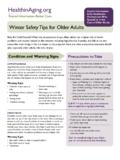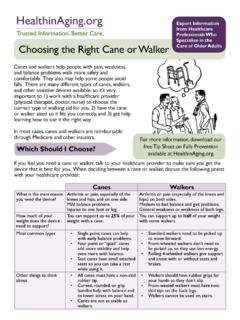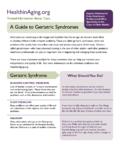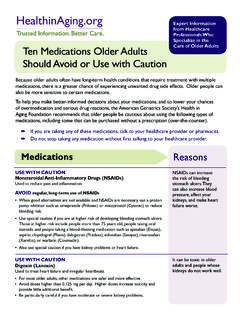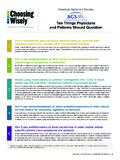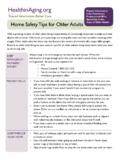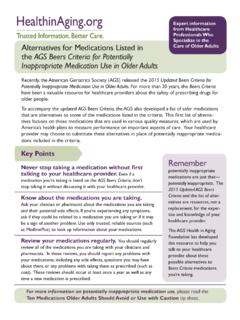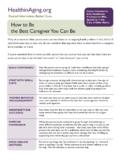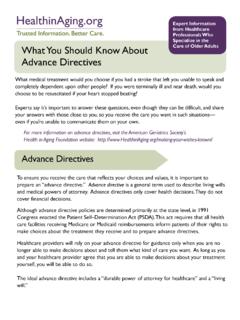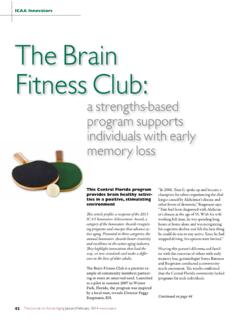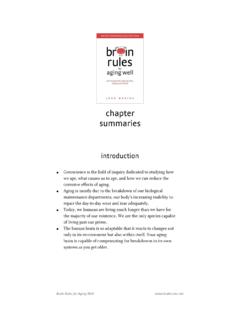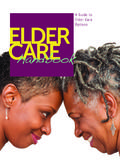Transcription of Expert Information Care of Older Adults Support …
1 Support Your memory with Simple StrategiesSeeing your healthcare professional regularly is crucial. Health problems such as high blood pressure, diabetes, and depression can cause thinking problems if left untreated. Exercising at least 30 minutes, three times a week can also help by increasing blood flow to your brain. Getting enough sleep at least 7 or 8 hours a night can help you concentrate and remember attention to sleep. Snoring while sleeping and feeling drowsy the next day can be signs of sleep apnea. People with untreated sleep apnea stop breathing briefly, but repeatedly, while sleeping. This interrupted breathing can deprive the brain of oxygen and cause memory a balanced, good diet is essential.
2 Choose foods like fruits and vegetables, along with whole grains, and fish like salmon, tuna, and sardines, which are rich in heart- and brain-healthy omega-3 fatty acids. Practice stress reduction techniques. Stress can make learning and recalling more difficult. Activities like yoga, meditation, and prayer can take the edge off stress and may help with memory . Keep hydrated. Drink enough water 6 to 8 glasses a day and reduce alcohol intake to no more than one drink a day. (One drink = 12 ounces of beer, 5 ounces of wine, or 1 ounces of hard liquor.)Don t do two or more tasks at once (multi-tasking). Multi-tasking such as reading this sheet and listening to the news at the same time will decrease recall later.
3 Multi-tasking overloads your working memory circuits, making it harder for you to process detailed Information . Keep it simple write down what you want to remember, and post reminders. Focus on what you want to remember concentrate, picture, repeat, associate, and Information from Healthcare Professionals Who Specialize in the care of Older AdultsHere are some tips about how paying attention to your overall health can help with memory :DISCLAIMER: This Information is not intended to diagnose health problems or to take the place of medical advice or care you receive from your physician or other healthcare provider. Always consult your healthcare provider about your medications, symptoms, and health problems.
4 December 2015 2015 Health in Aging Foundation. All rights reserved. This material may not be reproduced, displayed, modified, or distributed without the express prior written permission of the copyright holder. For permission, contact antidepressants, anti-anxiety drugs, blood pressure and cholesterol medications, sleeping pills, ulcer drugs, painkillers, and allergy meds and over the counter medications like Benadryl can affect your memory especially if you take more than one of these medications. Talk to your healthcare provider if you start having trouble remembering after starting a new drug. Adjusting dosages or switching from one medication to another may well solve the problem.
5 If you re being treated for diabetes, making sure the treatment is just right is particularly important, since blood sugar levels that are too high or too low can cause memory to fail. Chronic health conditions, if not controlled well, can contribute to memory problems. Heart disease, high blood pressure, diabetes, chronic obstructive pulmonary disease (COPD), chronic kidney disease, stroke, and thyroid disease are some of the conditions that contribute to memory practical strategies as you go about your day:Carry a diary or book with you to write down your appointments and tasks. If you prefer technology, use your smartphone or specific places for specific items.
6 Glasses might go on your nightstand. Every time you take them off, put your glasses in the same spot. Assign places for your keys, your medications, your wallet, your checkbook, and the remote remember several items if you can t make a written list, come up with a word or phrase using the first letter in the name of each item. For example, if you need to buy lettuce, salmon, coffee, eggs, milk, and apples, create a sentence with words that start with the first letter of each item L, S, C, E, M, and A. ( Lucy Saw Camels Eating Milk and Apples. ) Repeat that phrase to yourself a few times, or imagine a girl (Lucy) watching camels eat apples and milk.
7 To learn and remember someone s name, try visualizing the name and connecting the image with a noticeable feature of the person you ve just met. Let s say you were just introduced to a Mr. Douglas, who has large feet. Imagine him having dug ( Doug ) the last ( las ) of a series of holes, and standing with his big feet in that final hole. Finally, remember that, while your brain works like a computer, you should think of it as a muscle. Keep it healthy, happy, and well worked out.
